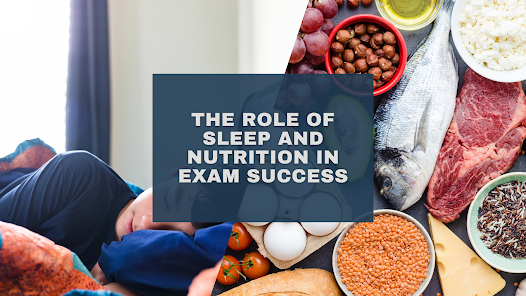The Role of Sleep and Nutrition in Exam Success
A race against time to learn as much as possible, late-night study sessions and a laser-like focus on IGCSE and IAL past papers are all common components of exam preparation. While diligence and hard study are important, maintaining a healthy lifestyle through adequate sleep and diet is also a crucial but frequently disregarded part of exam preparation. Concentration, memory retention, and general performance are all directly impacted by these elements.
The Power of Sleep for Academic Success
How Sleep Affects Learning and Memory
Sleep is an essential time for your brain to process and organize information; it's not simply about resting. The neural connections made throughout the day, especially those about memory, are reinforced by the brain while you sleep. Whether it's historical dates from IGCSE and IAL past papers or mathematical calculations, this method is essential for remembering what you've learned.Students who forgo sleep in favor of late-night study sessions frequently experience difficulties remembering material and become less attentive during tests. Lack of sleep also impairs critical thinking and problem-solving abilities, which are necessary for successfully answering exam questions.
Tips for Better Sleep During Exam Prep
- Keep a Consistent Sleep Schedule: Even during periods of heavy study, maintain a regular bedtime and aim for 7 to 9 hours of sleep each day.
- Establish a Sleep-Friendly Environment: Make sure your space is cool, quiet, and dark. Because the blue light from electronics can interfere with the creation of melatonin, avoid using them for at least an hour before bed.
- Include Techniques for Relaxation: After a long day of studying, try some simple stretches or deep breathing before bed to help you relax.
The Role of Nutrition in Exam Performance
Fueling Your Brain with the Right Foods
Your diet has a direct effect on how your brain works. For energy, the brain needs a constant supply of glucose, but where this glucose comes from is important. Your brain stays alert throughout the day thanks to the gradual and steady release of energy that whole grains, fruits, and veggies supply. On the other hand, junk food and sugary snacks cause energy dips and surges, which can make you feel lethargic when studying.Key Nutrients for Cognitive Function
- Omega-3 Fatty Acids: Found in nuts, seeds, and fish, omega-3 fatty acids are vital for memory retention and brain function.
- Antioxidants: By reducing oxidative stress, foods like spinach, dark chocolate, and berries enhance brain function.
- Protein: Amino acids, which are essential for the synthesis of neurotransmitters that improve mood and focus, are found in eggs, lean meats, and legumes.
- Hydration: Maintaining proper hydration is equally crucial. At least eight glasses of water should be consumed each day because even slight dehydration might affect cognitive function.
Balancing Sleep, Nutrition, and Study
The Integrated Approach
Combine a healthy lifestyle with your study regimen to ace the test. Make strategic use of IGCSE and IAL past papers by setting aside particular periods to practice them, making sure to factor in enough time for healthy eating and rest. In addition to improving your academic achievement, this all-encompassing strategy lowers stress, giving you the confidence you need to take tests.Pro Tip: Plan Ahead
Make a study schedule that incorporates rest, exercise, and eating breaks. This guarantees that you're taking care of your physical and mental health in addition to your academic preparation.




Comments
Post a Comment